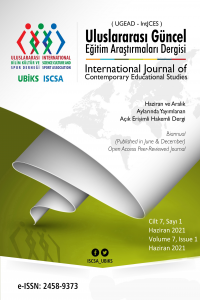Abstract
Bu çalışma üniversite öğrencilerinin çeşitli değişkenlere göre boş zaman yönetimlerinin incelenmesi amacıyla yapılmıştır. Betimsel nitelikte olan bu araştırmanın çalışma grubunu üniversitelerin çeşitli fakülte/yüksekokullarında öğrenim gören ve araştırmaya gönüllü olarak katılan toplam 1894 öğrenci oluşturmaktadır. Çalışmada veriler “Boş Zaman Yönetimi Ölçeği” ile toplanmıştır. Çalışma sonucunda; Üniversite öğrencilerinin boş zaman yönetimlerinde sırasıyla; “Amaç Belirleme ve Yöntem”, “Boş Zaman Tutumu”, “Programlama” ve “Değerlendirme” alt boyutlarının belirleyici olduğu tespit edilmiştir. Öğrencilerin boş zamanlarını yönetirken öncelikle; boş zaman için amaç ve önceliklerini belirleyerek yapabilecekleri aktiviteleri günlük veya haftalık olarak düzenledikleri, boş zamanları anlamlı ve mutluluk verici buldukları, boş zamana yönelik program yapmanın gerekliliğine inandıkları ancak zamanlarının bir bölümünü boş zaman aktiviteleri için değerlendiremedikleri belirlenmiştir. Öğrencilerin boş zaman yönetimlerinin cinsiyet, öğrenim gördükleri fakülte/yüksekokul, yaş, kaldıkları yer ve rekreatif etkinliklere katılma süresi değişkenlerine göre anlamlı olarak değiştiği saptanmıştır.
Keywords
References
- Açıkalın, A. (1998). Toplumsal, kurumsal ve teknik yönleriyle okul yöneticiliği. Ankara: Pegem Yayıncılık.
- Akgül, B.M. ve Karaküçük, S. (2015). Boş zaman yönetimi ölçeği: Geçerlik ve güvenirlik çalışması, İnternational Journal of Human Sciences, 12(2), 1867-1880.
- Akgül, B.M., Yenel, İ.F., ve Karaküçük, S. (2016). Evaluating free time management and its relation to life satisfaction, most participated leisure activities and gender among colllege students in Turkey. Social Sciences and Humanities Journal, 11(2),1-18.
- Akyürek, G. Kars, S. ve Bumin, G. (2018). Üniversite öğrencilerinin serbest zaman ile ilişkili tutum, yönetim ve memnuniyetlerinin incelenmesi. Gaziantep Üniversitesi Spor Bilimleri Dergisi, 3(2), 1-12.
- Güleryüz, S., Esentaş, M., Yıldız, K., & Güzel, P. (2020). Sosyal izolasyon sürecindeki bireylerin serbest zaman değerlendirme biçimleri: Sosyal medya kullanım amaçları ile sosyal medya bağımlılığı ilişkisinin incelenmesi. Focuss Spor Yönetimi Araştırmaları Dergisi, 1(1), 31-45.
- Özbey, S., Işıkgöz, E., Esentaş, M., & Güzel, P. (2018). Investigation of self-awareness levels of female students participating in international youth camp by different variables. Pamukkale Spor Bilimleri Dergisi, 9(3), 1-10.
Abstract
This study was performed in order to examine the leisure time management of university students according to different variables. The study group of this descriptive study consists of 1894 students studying at various faculties/schools of the universities and participating in the research voluntarily. The data in the study were collected with the "Leisure Time Management Scale". It has been concluded following the study that the sub-dimensions of "Goal Setting and Method", "Leisure Time Attitude", "Programming" and "Evaluation" are determinant respectively in the leisure time management of university students. It has been determined that the students first organize activities that they can do on a daily or weekly basis by determining their leisure goals and priorities while managing their leisure time, they find leisure time meaningful and pleasing, they believe in the necessity of making leisure time programs; however, they cannot spend some of their time for leisure activities. It has been established that the leisure time management of students significantly differs according to the variables of gender, faculty/school studied, age, place of residence and duration of participation in recreational activities.
Keywords
References
- Açıkalın, A. (1998). Toplumsal, kurumsal ve teknik yönleriyle okul yöneticiliği. Ankara: Pegem Yayıncılık.
- Akgül, B.M. ve Karaküçük, S. (2015). Boş zaman yönetimi ölçeği: Geçerlik ve güvenirlik çalışması, İnternational Journal of Human Sciences, 12(2), 1867-1880.
- Akgül, B.M., Yenel, İ.F., ve Karaküçük, S. (2016). Evaluating free time management and its relation to life satisfaction, most participated leisure activities and gender among colllege students in Turkey. Social Sciences and Humanities Journal, 11(2),1-18.
- Akyürek, G. Kars, S. ve Bumin, G. (2018). Üniversite öğrencilerinin serbest zaman ile ilişkili tutum, yönetim ve memnuniyetlerinin incelenmesi. Gaziantep Üniversitesi Spor Bilimleri Dergisi, 3(2), 1-12.
- Güleryüz, S., Esentaş, M., Yıldız, K., & Güzel, P. (2020). Sosyal izolasyon sürecindeki bireylerin serbest zaman değerlendirme biçimleri: Sosyal medya kullanım amaçları ile sosyal medya bağımlılığı ilişkisinin incelenmesi. Focuss Spor Yönetimi Araştırmaları Dergisi, 1(1), 31-45.
- Özbey, S., Işıkgöz, E., Esentaş, M., & Güzel, P. (2018). Investigation of self-awareness levels of female students participating in international youth camp by different variables. Pamukkale Spor Bilimleri Dergisi, 9(3), 1-10.
Details
| Primary Language | Turkish |
|---|---|
| Subjects | Studies on Education |
| Journal Section | Research |
| Authors | |
| Publication Date | July 20, 2021 |
| Published in Issue | Year 2021 Volume: 7 Issue: 1 |

